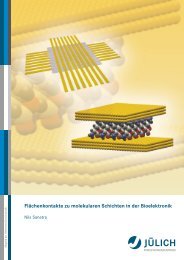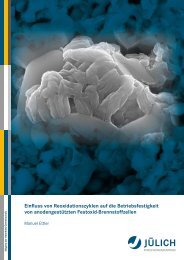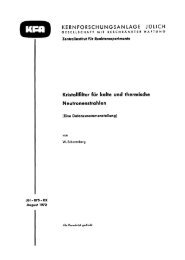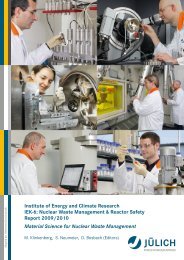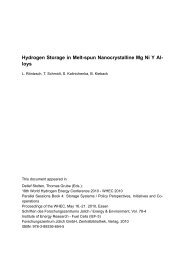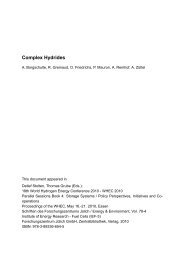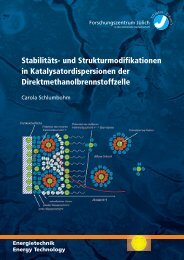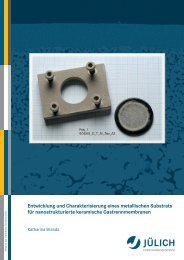View/Open - JUWEL - Forschungszentrum Jülich
View/Open - JUWEL - Forschungszentrum Jülich
View/Open - JUWEL - Forschungszentrum Jülich
Sie wollen auch ein ePaper? Erhöhen Sie die Reichweite Ihrer Titel.
YUMPU macht aus Druck-PDFs automatisch weboptimierte ePaper, die Google liebt.
DESULFURIZATION OF JET FUEL AND MARINE GAS OIL FOR APPLICATION IN<br />
MOBILE FUEL CELL SYSTEMS<br />
by Jochen Latz<br />
ABSTRACT<br />
Fuel cells are well suited for generating on-board power supply in aircraft, ships and heavy<br />
goods vehicles to improve the energy efficiency and to cover rising demands for electrical<br />
energy. In order to operate fuel cells with the fuels available on board, the fuel is converted<br />
into a hydrogen-rich gas by a process of catalytic reforming. Since both the catalysts in the<br />
reformer and also in the fuel cell are deactivated by the sulfur compounds contained in the<br />
fuel, the fuel must be desulfurized.<br />
Whereas diesel fuel for road vehicles within the EU is already desulfurized at the refinery, jet<br />
fuel is permitted to have up to 3000 ppm of sulfur worldwide and marine gas oil for fuelling<br />
vessels on inland waterways can contain up to 1000 ppm in the EU. Consequently, on-board<br />
desulfurization is required for the use of fuel cell auxiliary power units (APUs) on aircraft and<br />
ships. Since the hydrodesulfurization process used in refineries is not suitable for mobile<br />
applications, the present work had the aim of developing alternative processes and determining<br />
their technical feasibility.<br />
To this end, a large number of processes discussed in the literature were assessed with respect<br />
to their application in fuel cell APUs and four potentially suitable processes selected for<br />
detailed investigation. Laboratory tests revealed that adsorption in combination with separation<br />
by means of distillation or pervaporation is a suitable process for the desulfurization of jet<br />
fuel. Additionally, hydrodesulfurization with presaturation provided convincing results on a<br />
laboratory scale.<br />
In order to verify the technical applicability of fuel cell APUs, three desulfurization processes<br />
were assessed with respect to energy demand, size and durability. Of these processes, hydrodesulfurization<br />
with presaturation provided the best results. Whereas the technical application<br />
of the process consisting of adsorption and pervaporation requires further research<br />
work, the process of adsorption and separation by means of distillation is not economically<br />
feasible, above all due to the high energy demand.<br />
Finally, the technical applicability of hydrodesulfurization with presaturation was demonstrated<br />
in a pilot plant for a fuel cell APU with a power of 5 kWel, going beyond the laboratory<br />
scale. The aim of developing a suitable process for the desulfurization of jet fuel in fuel cell<br />
APUs has thus been achieved.<br />
However, the investigations on marine gas oil showed that desulfurization in fuel cell APUs is<br />
not possible at present even with the alternative desulfurization approaches currently available.<br />
V



